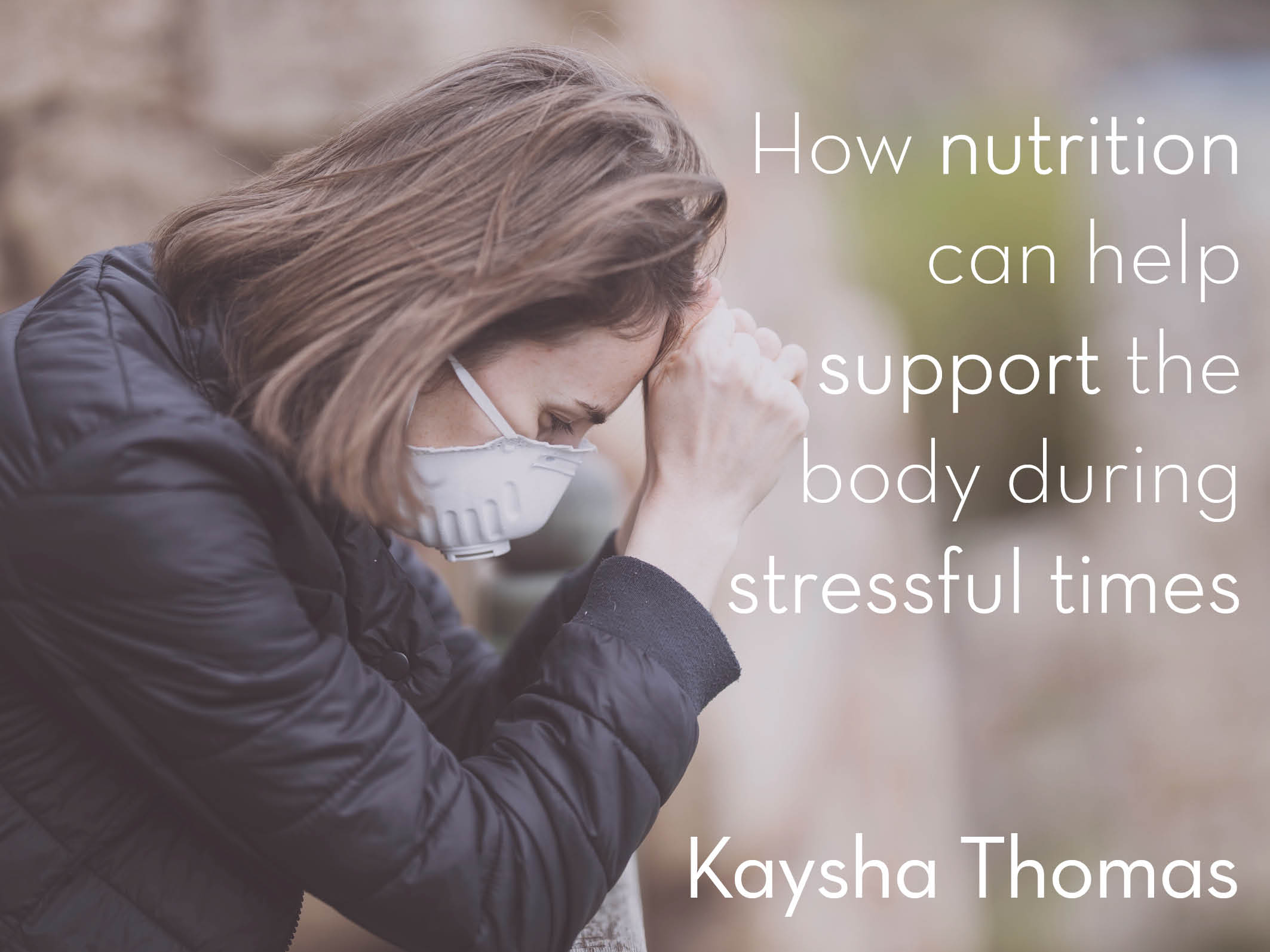Beauties, we’re thrilled to share with you this feature from Kaysha Thomas, a Registered Nutritional Therapist, where she talks about how nutrition can help support your body through this stressful time.
Many of our lives have been affected by COVID 19. Job losses, juggling homeschooling whilst working from home and experiencing loneliness during isolation, even the fears around lockdown easing can affect our mental health. COVID 19 or not, will never be able to completely avoid stress as it is a normal part of life.
Experiencing occasional stress has very little impact on our overall health. However prolonged and repeated high levels of stress, can have a detrimental effect on our emotional and physiological wellbeing.
If you find that you are unable to cope with your current stress levels, I encourage you to speak to your GP or a therapist. Whilst nutrition can help support your body, it’s important to remember that stress starts in the mind. Speaking to a mental health professional can give you the emotional support needed to help you navigate through stressful situations as well as give you some tools to help you manage your stress load.
How the body reacts to stress
Our bodies response to stress is initiated and maintained by adrenaline and cortisol. These chemical messengers prepare us to fight, take flight (run) or to freeze. Under normal circumstances, this process is short-lived. But during times of prolonged stress, adrenaline and cortisol levels stay elevated and we may experience symptoms such as increased appetite, sugar or salty snack cravings, digestive issues, inability to sleep (despite feeling exhausted) and low energy levels.
Whilst we may not always be able to control the external factors that cause stress, we can support our bodies through nutrition and lifestyle.
Balance blood sugar levels
To prepare us for action, cortisol stimulates the release of glucose into the bloodstream. This is to give us an immediate energy supply. The release of glucose causes a spike in our blood sugar levels and stimulates the release of insulin.
Insulin’s role is to get sugar out of the blood and into the cell that requires the energy (e.g. the muscles). What we experience is a rise and drop in blood sugar levels. If our blood sugar levels drop too low or too fast, we experience feelings of dizziness, feeling shaky and irritability and poor concentration.
We can manage our blood sugar balance by eating regular meals and snacks that contain a nourishing amount of carbohydrates, fats and protein. This helps to provide a steady stream of energy (glucose) to the body. Aim to include a variety of wholegrain foods (e.g. oats, brown rice, buckwheat). As heavily restricting sugar intake often causes an increased desire for sweet foods, I feel it’s important to include some of the foods that you enjoy.
Reduce caffeine
Caffeine is the stimulant that we often turn to when we need a quick pick me up. Unfortunately, when we are in a state of chronic stress, caffeine initiates a vicious cycle. Drinking caffeinated drinks mimics the stress response in the body. We drink it to keep us from feeling so frazzled, yet, it further feeds into the stress cycle by stimulating the release of the same chemical compounds that we’re trying to balance out.
Moreover, caffeine interrupts with our sleep cycle that often results in poor sleep quality. We wake up feeling tired and do what? Reach for the coffee and off we go again. Some are more sensitive to caffeine than others and may need to cut it out altogether. Otherwise, I recommend swapping caffeinated drinks like coffee, energy drinks, strong teas for herbal teas and coffee alternatives such as Teeccino or roasted barley drinks like whole earth no caffeine coffee alternative.
If you are sensitive or reliant on caffeine, you will experience a few days of withdrawal (headaches, low mood and fatigue). So I would plan this around days where you don’t have too much on your schedule.
Eat your fruit and vegetables
Eat a rainbow (of colourful foods) to ensure a good variety of antioxidants. This is key in defending the body against the damaging effects of oxidative stress which is often present with anxiety.
Dark leafy greens are rich in magnesium which is a natural muscle relaxant. Getting a variety of vegetables will give you a better chance of getting enough vitamins and minerals to help you produce calming chemical messengers such as serotonin (often referred to as the happy brain chemical).
The antioxidants found in fruits and vegetables also help protect the body from the damaging inflammatory effects of stress.
Omega 3 fats
Omega 3 is found in oily fish such as mackerel, sardines and salmon. Vegetarian sources include omega 3 fortified eggs, flaxseeds, chia seeds and walnuts. These essential fats have many beneficial effects such as helping to reduce inflammation, improve brain function and improve water balance in the body. Aim for around 2 portions of oily fish or 3-4 vegetarian sources per week.
Stay Hydrated
Keeping hydrated is essential for both your mental and physical health. Dehydration increases cortisol levels in the body. I recommend aiming for at least 2 litres a day. If you notice that your urine is quite dark, you may need to increase this further. Ideally, your urine would be a light straw colour.
Protein
Chronic stress increases our protein needs as it is a catabolic process (it breaks the body down). The building blocks that make up protein-rich foods, help formulate the chemical messengers that we need to regulate our nervous system.
Protein facilitates the anabolic process (it builds up the body) as is also needed to maintain optimal muscle mass. The recommended daily intake is around 0.8 per kg of body weight per day. The best strategy for this is to split it evenly throughout your day (this will also help with blood sugar balance).
Foods such as meat, poultry, fish, nuts, beans, eggs and lentils are all great sources of protein. If you’re a vegetarian, be sure to vary your protein sources so that you get all the essential amino acids.
In my next post, I’ll talk about the lifestyle changes that you can make to help your body cope with stress. In the meantime, think about 3 simple changes you can make to your diet to give your body more support during stressful times.
Picture credit: Photo by engin akyurt on Unsplash
Kaysha is a Registered Nutritional Therapist & Pilates and blogger promoting mental health in the black community. Kaysha covers topics such as eating disorder recovery, body image and diversity issues in the wellness space. She studied at the Institute of Optimum nutrition and BASI Pilates UK and is currently studying for a Masters in Sport & Exercise Nutrition.
Find her on Instagram @kayshathomas and her website kayshathomas.com









Leave A Comment